Synology FlashStation FS2017
Synology’s FS2017 brings all-flash storage down to a price point SMBs will like
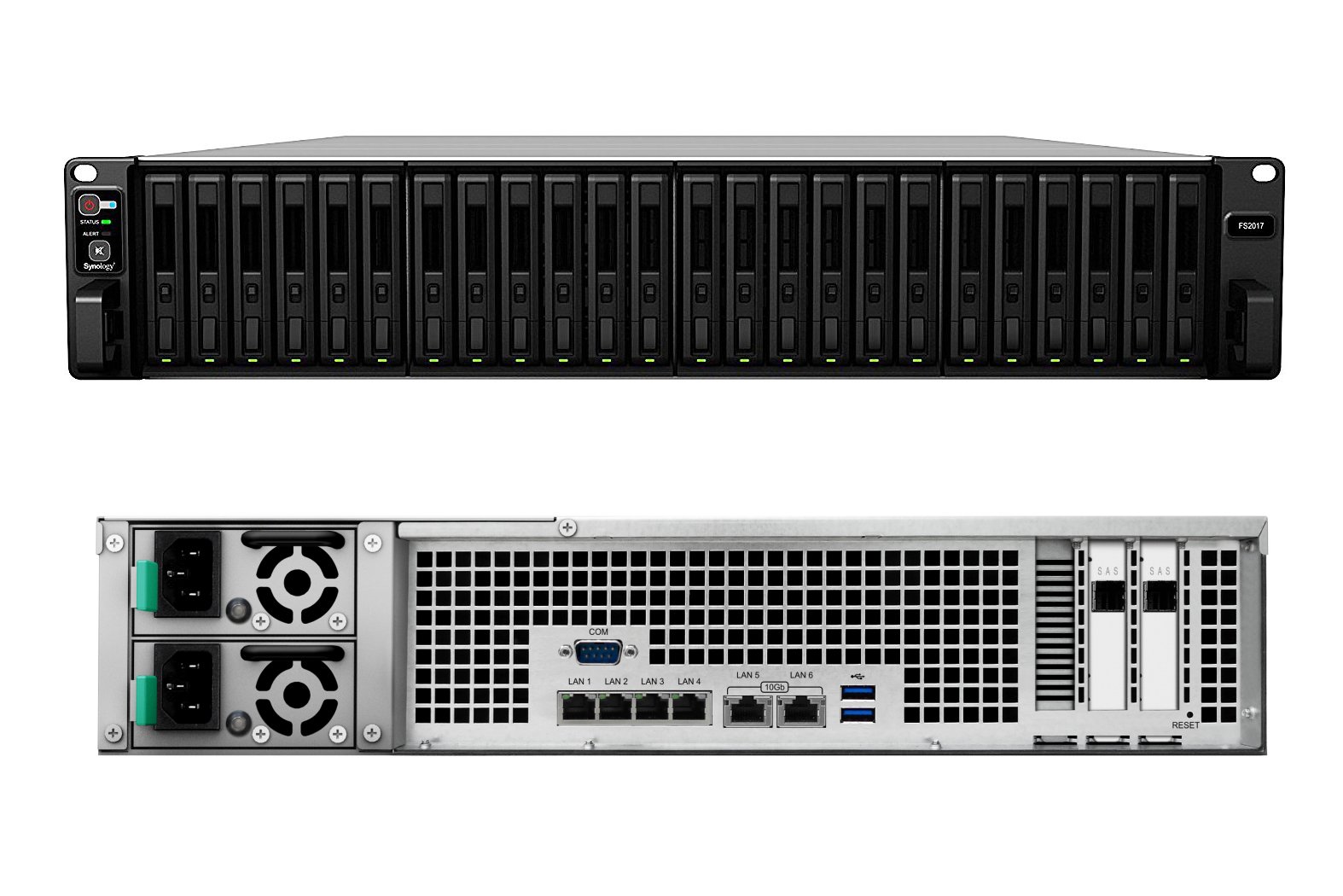
The FS2017 delivers on Synology’s performance promises and the low price will appeal to budget-conscious SMBs looking for a versatile and affordable all-flash storage array
-
+
Good value; Great 10GbE performance, Gigabit and 10GbE ports; SAS3/SATA SSD support; Feature-rich DSM software
-
-
Another noisy Synology appliance

The FlashStation FS3017 signalled Synology's intentions on the all-flash storage market earlier this year and its new FS2017 aims to make the technology even more appealing to SMBs. This 2U rack appliance offers the same 24 SFF bays as its bigger brother but its more modest hardware specification has allowed Synology to slash costs.
Whereas the FS3017 costs a shade under ten grand, prices for a diskless FS2017 start at around 5,000. The performance will be lower as the FS2017 is powered by a single 8-core 2.1GHz D-1541 Xeon CPU the FS3017 is endowed with dual 2.4GHz E5-2620 v3 Xeons.
Memory is the DDR4 ECC RDIMM variety and the FS2017 starts with 16GB which can be upgraded to 128GB. It's actually better endowed in the network department as it offers the same dual embedded 10GBase-T ports as the FS3017 but augments them with a quartet of Gigabit.
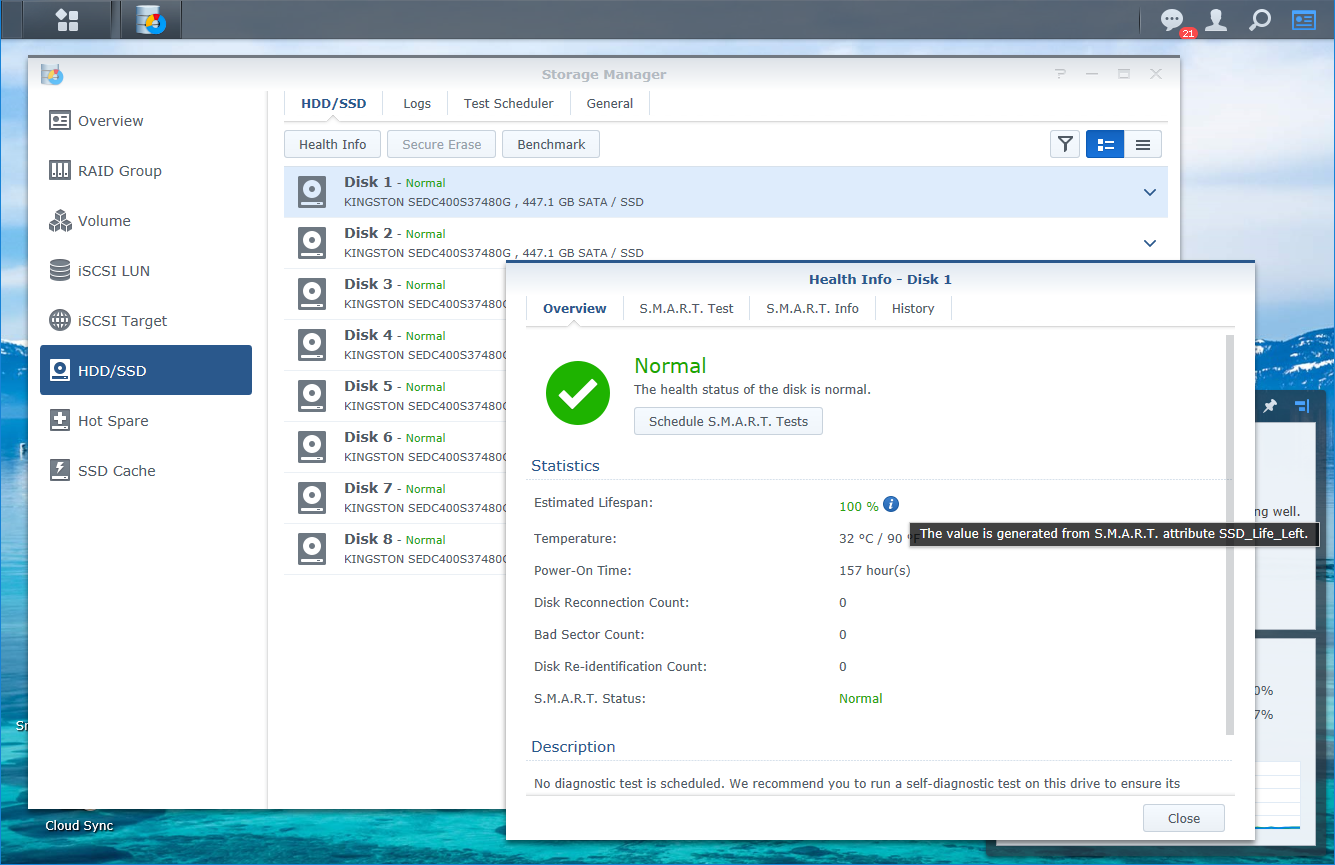
We tested using low-cost Kingston SATA SSDs and kept an eye on their health from the Storage Manager app
Quality, design and noise
The low 45W TDP of the D-1541 Xeon reduces power consumption allowing Synology to fit smaller 500W dual redundant PSUs. Physically, there are few other differences as the sturdy chassis uses the same removable panel in the lid with four hot-plug cooling fans lurking underneath.
Noise levels make the FS2017 best suited to a dedicated room as even on the DSM quiet' fan mode, the SPLnFFT iOS app on our iPad recorded 60dB from one metre in front of the appliance. If you add a network card, this mode is disabled and on the next cool' setting, noise levels went up to 66dB. Select the full-speed' mode at your peril as this generated a ridiculously high 77dB.
Sign up today and you will receive a free copy of our Future Focus 2025 report - the leading guidance on AI, cybersecurity and other IT challenges as per 700+ senior executives
Dual Synology SAS12G PCI-Express cards service all front hot-swap bays allowing the FS2017 to support low-cost SATA and high-performance SAS3 SSDs. There's one spare expansion slot and the FS2017 is certified for industry-standard 10GbE, 25GbE and even 40GbE network adapters.
The appliance is expansion-ready as up to two 12-bay RX1217sas or 24-bay RX2417sas disk shelves can be connected to the external port on the first SAS card (the second card's port is labelled for maintenance use only). It's also cheaper to expand this appliance as the FS3017 requires an optional FXC17 SAS3 card which costs around 700.
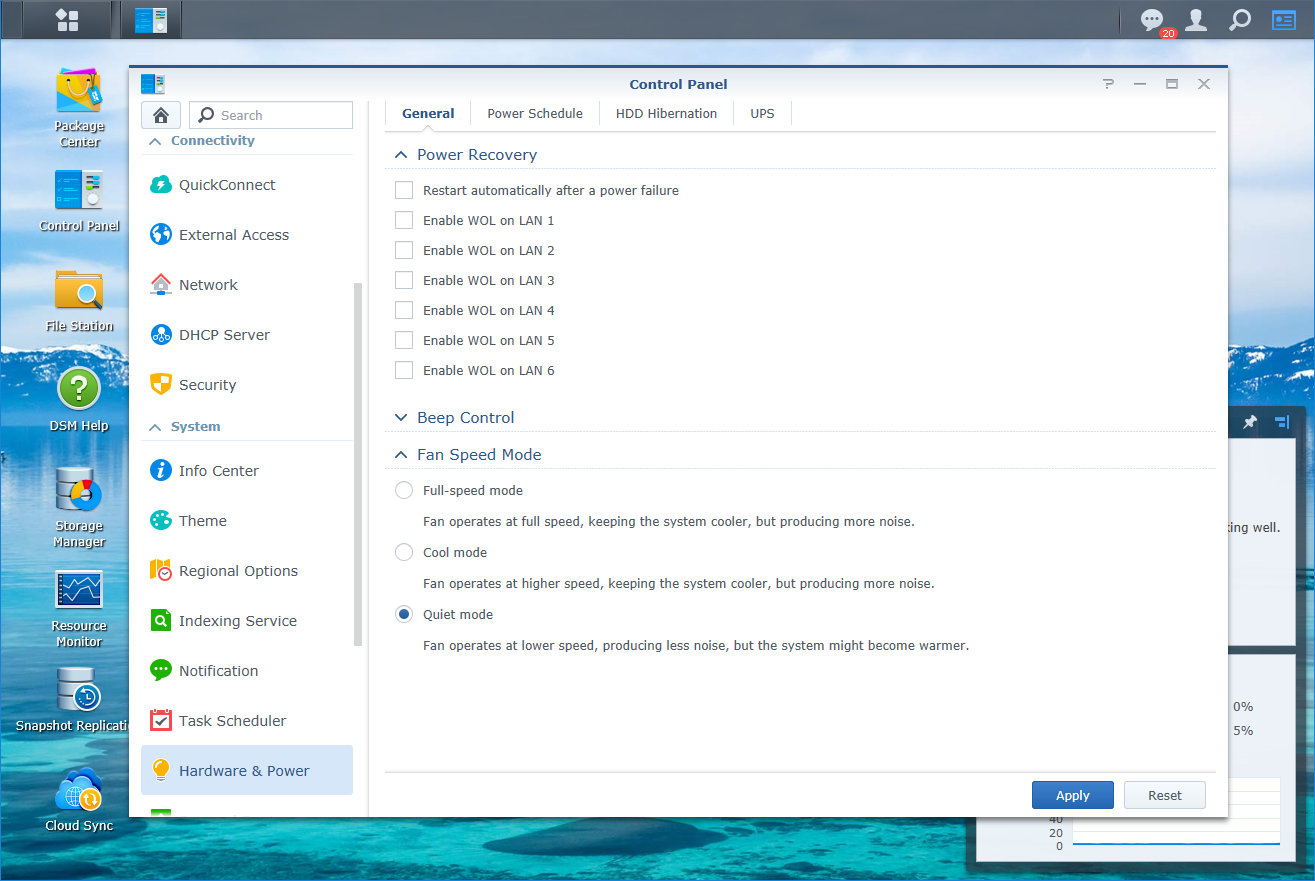
The appliance has three fan modes but they're all too noisy for deployment in an office
Good 10GbE performer
With eight Kingston DC400 480GB SATA SSDs configured in a Synology RAID F1 array, we recorded good overall performance. A NAS share mapped to a Lenovo x3550 M5 Windows server over 10GbE returned fast sequential read and write speeds of 9.2Gbps and 8Gbps.
I/O throughout was also good as Iometer set to 4KB transfer requests reported sequential read and write rates of 98,500 IOPS and 78,000 IOPS. For random operations, we saw read rates remain the same while writes dropped to 60,000 IOPS.
IP SAN 10GbE performance was respectable with a 500GB target returning sequential read and write speeds of 9.1Gbps and 7.9Gbps. Random read and write I/O throughput settled at 84,000 IOPS and 56,800 IOPS.
Synology's claimed 90,000 IOPS for iSCSI random writes is quite achievable. With Iometer running on two servers each with a dedicated iSCSI target, we recorded a cumulative throughout of 89,800 IOPS
We also tested general SQL database performance with Iometer configured for 256 outstanding I/Os, a 16KB block size, 66% read, 34% write and a 100% random distribution. After leaving the test to settle, the FS2017 returned an impressive 50,000 IOPS although average latency was down at 20.5ms.
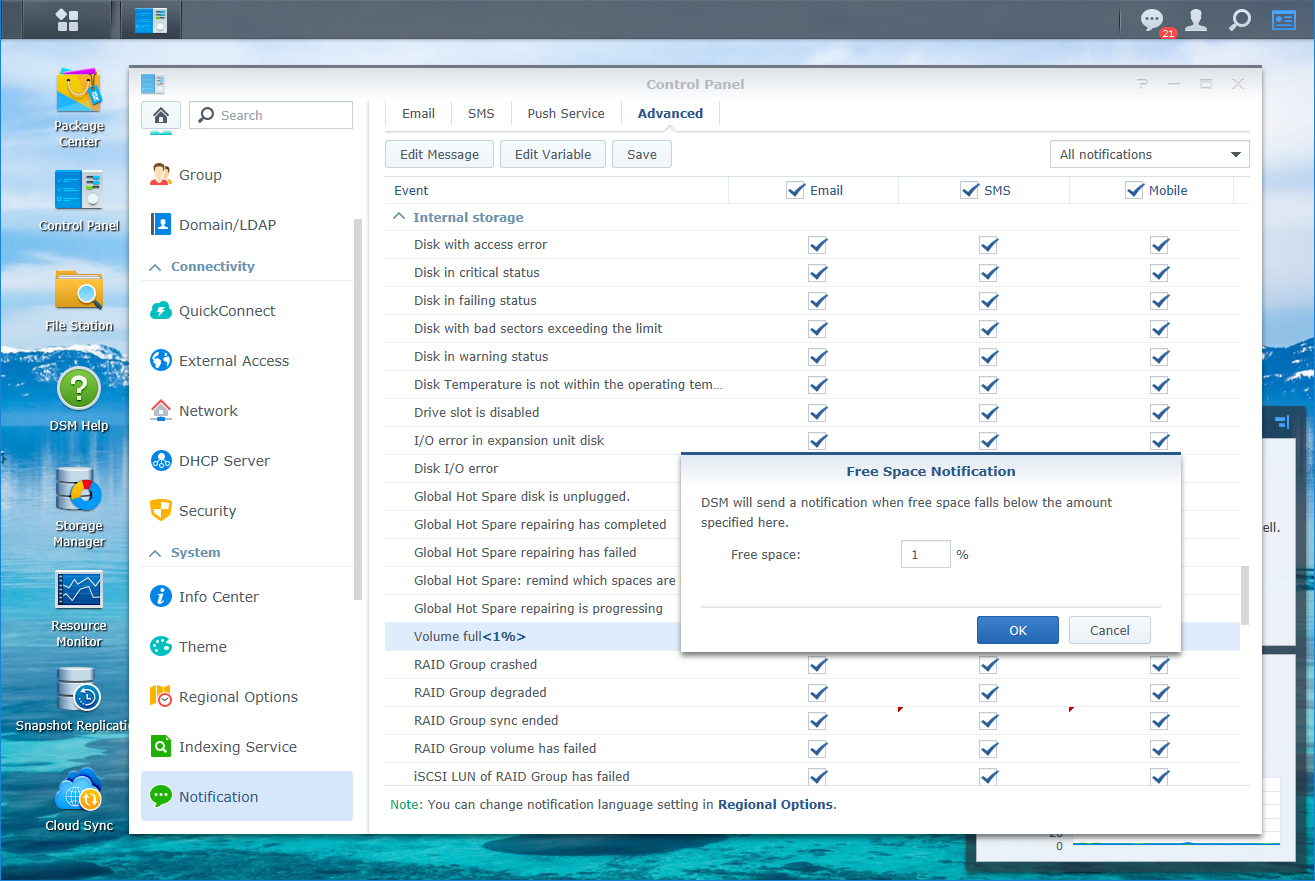
We set the appliance's notification system to alert us when volume space was getting low
DSM features
Synology's DSM 6.1 software offers a superb range of storage features. Its new RAID F1 option is designed to offset SSD wear across the array by nominating one drive to receive more parity bits that the rest.
Support for BTRFS volumes brings NAS share and iSCSI LUN snapshots into play. Managed by the slick Snapshot Replication app, we created snapshots on demand and scheduled them at regular intervals as often as every five minutes.
Recovering lost data is a cinch as the app allowed us to choose a snapshot, clone it or copy it in place. We could also browse share snapshot contents and either copy a selected file to a new location or use the File Station app to email it to another user.
The FS2017 isn't designed to be a general-purpose backup repository which is better handled by products such as Synology high-capacity RS18017xs+ which we reviewed in our sister title, PC Pro. However, if you want to get your data secured off-site, DSM's Hyper Backup app provides facilities for remote, Rysnc and cloud backups.
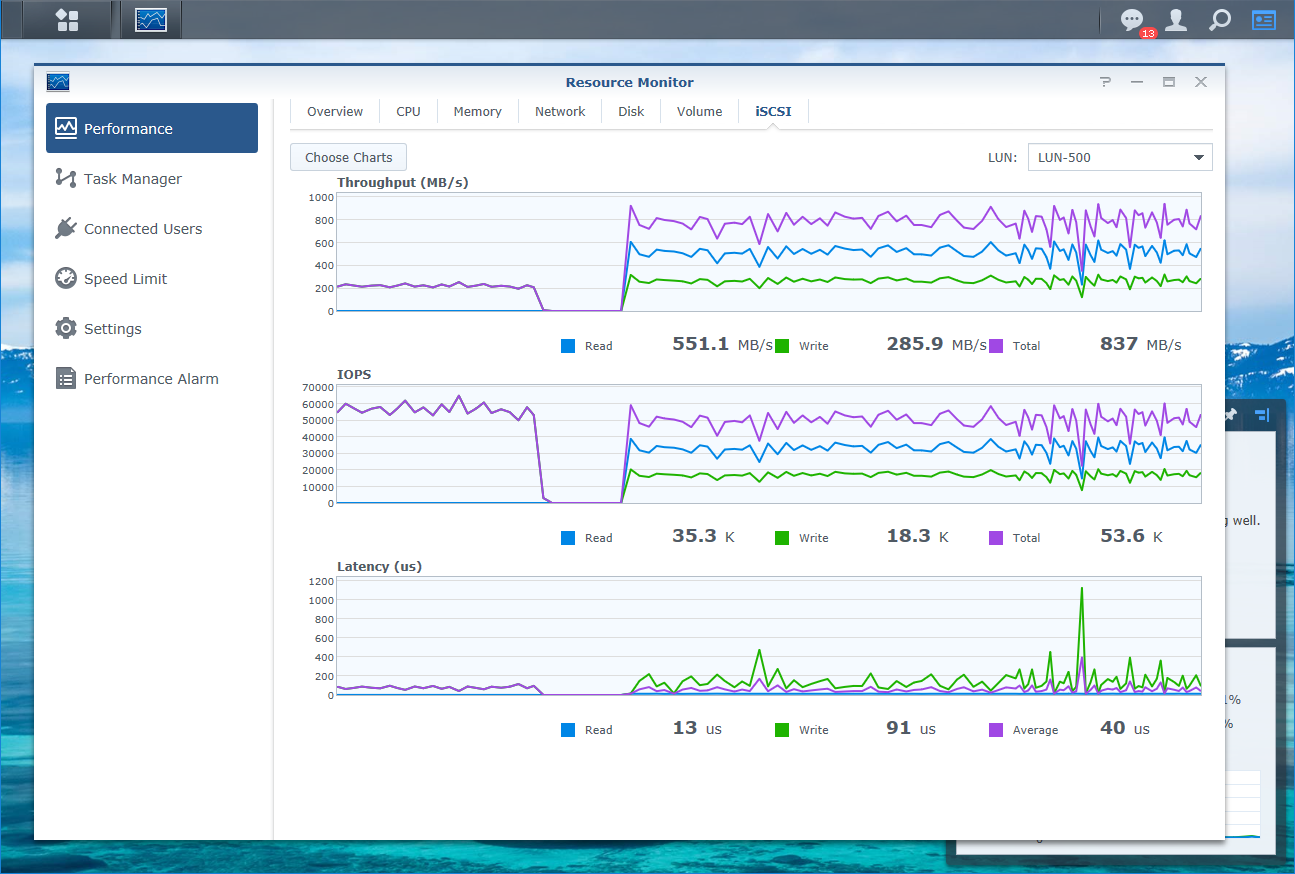
During testing, we used the DSM Resource Monitor to keep an eye on appliance utilisation
Conclusion
The FS2017 is well-built and comes with dual redundant PSUs although the noisy cooling system relegates it to a sound-proofed cabinet or dedicated server room. Even so, it's a versatile storage solution as it supports both SATA and SAS3 SSDs while Synology's DSM software delivers an impressive range of features
The lower hardware spec does have an impact on performance as it is noticeably slower than the FS3017 but we found the FS2017 does deliver on Synology's speed claims. Furthermore, with the price of a diskless model starting at around 5,000, the FS2017 is a better option than the FS3017 for SMBs that want an affordable all-flash storage solution.
Verdict
The FS2017 delivers on Synology’s performance promises and the low price will appeal to budget-conscious SMBs looking for a versatile and affordable all-flash storage array
Chassis: 2U rack
CPU: 2.1GHz D-1541 Xeon
Memory: 16GB DDR4 ECC RDIMM (max 128GB)
Storage: 24 x SAS3/SATA III hot-swap drive bays
Controller: 2 x Synology SAS12G PCI-Express cards
Array support: RAID0, 1, 10, 5, 6, hot-spare, JBOD, F1
Network: 4 x Gigabit, 2 x 10GBase-T
Other ports: 2 x USB 3
Expansion: External SAS3 port; 1 x PCI-e 3 slot
Power: 2 x 500W hot-plug PSUs
Management: Web browser
Warranty: 5-year limited
Dave is an IT consultant and freelance journalist specialising in hands-on reviews of computer networking products covering all market sectors from small businesses to enterprises. Founder of Binary Testing Ltd – the UK’s premier independent network testing laboratory - Dave has over 45 years of experience in the IT industry.
Dave has produced many thousands of in-depth business networking product reviews from his lab which have been reproduced globally. Writing for ITPro and its sister title, PC Pro, he covers all areas of business IT infrastructure, including servers, storage, network security, data protection, cloud, infrastructure and services.
-
 Hackers are using LLMs to generate malicious JavaScript in real time – and they’re going after web browsers
Hackers are using LLMs to generate malicious JavaScript in real time – and they’re going after web browsersNews Defenders advised to use runtime behavioral analysis to detect and block malicious activity at the point of execution, directly within the browser
By Emma Woollacott Published
-
 AI coding is taking off in the US – but developers in another country are “catching up fast”
AI coding is taking off in the US – but developers in another country are “catching up fast”News Developers in the United States are leading the world in AI coding practices, at least for now
By Nicole Kobie Published
-
 Veeam ramps up growth plans with trio of leadership hires
Veeam ramps up growth plans with trio of leadership hiresNews The data resilience vendor has reshaped its senior leadership team to deepen partner engagement and streamline customer success in the AI era
By Daniel Todd Published
